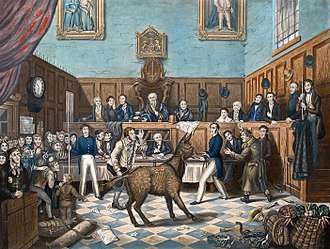Cruel Treatment of Cattle Act 1822

A painting of the trial of Bill Burns, the world's first known conviction for animal cruelty under the 1822 Martin's Act, after Burns was found beating his donkey. The prosecution was brought by Richard Martin, also known as "Humanity Dick", and the case became memorable because he brought the donkey into court.
The Cruel Treatment of Cattle Act 1822 (3 Geo. IV c. 71) was an Act of the Parliament of the United Kingdom with the long title "An Act to prevent the cruel and improper Treatment of Cattle"; it is sometimes known as Martin's Act, after the MP and animal rights campaigner Richard Martin. It was one of the first pieces of animal welfare legislation. The Act listed "ox, cow, heifer, steer, sheep, or other cattle". This was held not to include bulls. A further act (5 & 6 Will. IV. c. 59 s. 2) extended the wording of this Act to remedy the issue.[1] This Act was repealed by the Cruelty to Animals Act 1849.
See also
References
| Wikisource has original text related to this article: |
- ↑ The Rights of Persons, According to the Text of Blackstone: Incorporating the Alterations Down to the Present Time, Sir William Blackstone and James Stewart, 1839, p. 79.
External links
- "Text of the Act to Prevent the Cruel and Improper Treatment of Cattle". Archived from the original on 30 October 2014.
This article is issued from
Wikipedia.
The text is licensed under Creative Commons - Attribution - Sharealike.
Additional terms may apply for the media files.